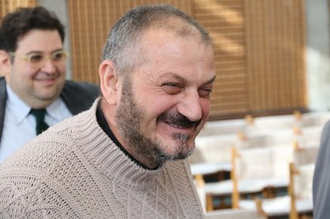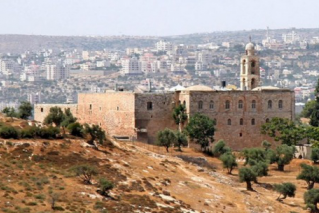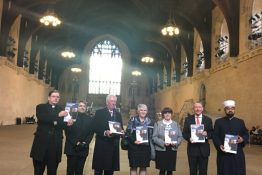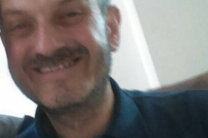Priest held hostage by IS/Daesh reflects on his experience

Father Jacques Mourad
Source: WCC
Father Jacques Mourad is a monk and priest of the community of Mar Moussa in Syria. He is very active in Islamic-Christian dialogue and belongs to the diocese of Homs of the Syriac Catholic Church. In 2015, he was captured and held hostage by the Islamic State, before escaping with the help of Muslims. During Advent, Father Mourad visited the Ecumenical Centre, where he led a special midday prayer for peace in Syria and the Middle East.
Can you tell us about your community and your life before you were captured?
Fr Mourad: I am co-founder of our community, together with Father Paolo Dall'Oglio, an Italian Jesuit who has been held hostage by Daesh since 2013 and who has gone missing without a trace. Fr Paolo came to Syria in 1982, where he discovered the abandoned monastery of Mar Moussa, which dates back to the 6th century. During a retreat, the good Lord placed in his heart the desire to restore his house. Beginning in 1984, he restored it during the summers together with a group of young people from various parishes in Syria. In 1991, we began our monastic life there. Little by little, the good Lord blessed us with new confreres. Currently there are seven of us in the community, scattered between Syria, Iraq and Italy. In 2000, our bishop entrusted us with another abandoned monastery - the 5th century monastery of St Julian in al-Qaryatayn, as well as the local parish. It was a good opportunity for our vocation of conducting dialogue with Muslims. We laboured there for 15 years.
Then everything changed with the arrival of the Islamic State. How were you taken prisoner?
Fr Mourad: In 2015, the situation in our region became difficult. In May, a group of jihadists from the Islamic State invaded the monastery and took me hostage. I was held prisoner for four months and 20 days. I had been a hostage for three months when the Islamic State gained control over the entire region of al-Qaryatayn, and they took 250 of my parishioners hostage. They transferred me from Raqqa, where I was being held in a bathroom, to Palmyra, where all of the Christians were in prisons: children, the handicapped, women and the elderly. It was a truly shocking and painful encounter. But for them it was a joy because they thought that I was already dead. It was a sign of hope. After 25 days, a declaration from the caliphate allowed us to return to al-Qaryatayn. But we were almost prisoners in our homes. Every day the city was bombed by Syrian and Russian planes. Thanks to a Muslim friend, I was able to escape on motorcycle; we crossed the desert and I arrived in Homs. There was an entire group of Muslims who helped us during this time. Thanks to them, who risked their lives, we were able to escape. Now the majority of these Christians are in two villages near Homs, and we continue to support them. But they are fine, thanks God.
How did this event affect you, and what do you particularly remember?
Fr Mourad: I don't want anyone to know what it's like to be a prisoner. It is the most difficult experience you can imagine. But I don't want to remain locked up and shocked by this state. Now I consider this experience a gift which God has given me so that I can experience the importance of dialogue and living together more profoundly. Thanks to this testimony of Christian love, friendship with the Muslim community, and the good we have done together, my life was saved. This is central to my experience. In the years before I was captured, we were able to help many displaced Muslim families, the poor, young university students and the sick. We restored many Muslim homes that were destroyed during the war. All of this bore fruit during my captivity, because these testimonies prevented the jihadists of the Islamist State from killing me. Thanks to this, a Muslim had the courage to risk his life in order to save me.
It was also an opportunity to discover the Islamic State. I did not base my opinion on what I saw on the internet or in the media, but on people. God has given me two gifts - kindness and silence. These helped me a lot to open myself up to the jihadists who came to the prison in order to abuse me. It was an opportunity to speak with them and find out who they were. Ultimately, they are normal people like us. But their insane idea is a reaction against the injustice and evil we experience in this world.
You got to know the people behind the Islamic State. What can we learn from this?
Fr Mourad: The Islamic State movement is very interesting to study. We have to understand why it exists and that it can recur in another way. We have to learn from this experience that people have the means of reacting against ongoing evil, violence and injustice. If we do not open up ourselves, if we do not listen to those who are suffering the most, to those who live in affliction, we cannot overcome this crisis. Peace cannot be something that is independent in each country. There is a proverb in Syria which says: "If your neighbour is well, you are well." If Syria is not doing well, all the countries around it cannot be doing well.
After escaping, you did not stay in Homs. What has happened since this adventure?
Fr Mourad: After a few months, I decided to leave Syria. I went to Sulaymaniya in Iraq to support my confrere, Father Jens Petzold, who also takes care of our mission there and who has received fifty refugee families from Qaraqoch, in the plains of Nineveh, since 2014.
Grégoire de Fombelle is a Communications Project Assistant at the World Council of Churches


















